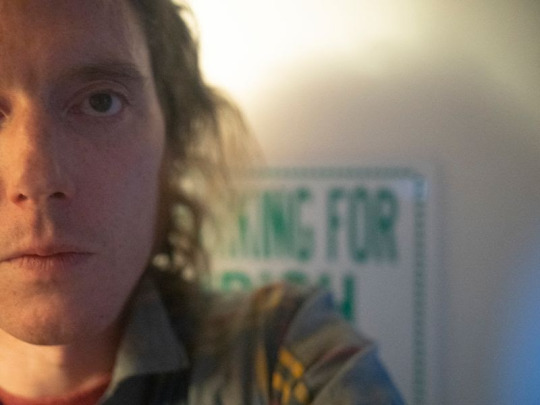#jason albertini
Text
Helm is pushing towards the fallen side, systems fail
Couldn't work itself out, it's not just you
But walk away
And so, to the moment of this despair, I disconnect
And still stands to reason
We all live to die, alone, that means by yourself
It works just fine
Still takes this lifetime to really understand
That it's alright, but still I laugh to myself
Don't know why
6 notes
·
View notes
Text
Mf’s will be asked what their favorite song is and say Untitled (61) by Duster
I’m mf’s
#duster#untitled (61)#clay parton#canaan dove amber#jason albertini#stratosphere#contemporary movement#transmission flux
5 notes
·
View notes
Text
#(the fact that this whole album was recorded on a fucking 4 track.......)#helvetia#headless machine of the heart#jason albertini#Spotify
4 notes
·
View notes
Text
Helvetia Interview: Back to Normal

BY JORDAN MAINZER
On the surface, This Devastating Map sounds like other albums from Jason Albertini’s Helvetia, a mix of short-form and mid-range tracks, its slinky, meandering, spindly pop weirdness mixing nicely with his muted vocals. It also presents like a victory lap for a busy half-decade for Albertini, who had a short run in Built to Spill and saw beloved slowcore band Duster (he is one of 3 members) reunite for shows, a box set, and a new record. But dig a little deeper into the lyrics and titles, and you start to feel the record’s true context. This Devastating Map--a reference to Albertini’s battles with drug addiction and current sobriety, plus quite literally the scars on his body--is a record about finding the clarity in himself once again, getting clean of drugs and mitigating the mental struggles that made him turn there in the first place. And the recording of it, with Steve Gere (also a member of Built to Spill during Albertini’s tenure) and Samantha Stidham, was a therapeutically social process, in contrast to what Albertini normally undertakes in silo for Helvetia records.
Speaking to me from his home in Portland, Albertini opened up about his story of addiction, one which he wasn’t sure he wanted to talk about. He eventually decided to on account of the fact that, according to him, it’s, like it or not, a part of who he was, or is. But he doesn’t take for granted the fact that This Devastating Map came out, nor that he’s been ceaselessly working on new music during the pandemic. Over the last few years, struggling with addiction, he was busy, but not creative. Now, as he says, making music is all he wants to do. “Who knows how many years I’ll feel that this is okay, just hanging out and playing?” he said. Plus, he thinks the next record to come out is the best one he’s ever done. He’s proud of himself again.
Read our conversation below, edited for length and clarity.
Since I Left You: To start: The record was inspired by you getting clean.
Jason Albertini: I dealt with a substance abuse problem. It mainly comes from my foray into trying to clean up my depression. In my late 20′s, I started experimenting with drugs to relieve this part of my personality I couldn’t really explain. It was fairly innocent for a while, but then I did slip off and became a heroin addict for a while. I haven’t really talked about it and wasn’t sure I was really gonna talk about it.
In the last year, I got out of rehab. I went to one rehab for a couple months. It’s weird the way it slipped in: The first time around, it was just a few months that took me down really quick. Then I got off and started playing music again--when I’m loaded, I can’t create anything. I had a relapse, and that one was pretty bad.
It’s kind of hard to explain. It was a real fight. When I was getting off the maintenance drugs, I started recording a lot in my freedom. I stopped taking anything, [still] getting help with ADD. [But] there were all these things that for me bloomed into a serious drug addiction. Adderall, anxiety medication, it all stopped working after a while, and I got really unlucky. Over a year now I’ve got out of rehab, I’ve been doing really well. It was really hard getting off all that maintenance stuff, and it was hard for my mind to start working properly again--not music-wise. The music came right back. But me relating to other people and me dealing with what’s still my insecurities and the bad habits I had to break that aren’t just drug-related. Years of isolating.
That works for music. When I fell off, it wasn’t for a long time, but the reverberation from that I still deal with, even though I am as sober as can be at this point. I don’t do AA, because I’ll drink wine every once in a while. I survived. The music was all dealing with trying to make sense of what happened. At first, I was gonna make it a personal mission to shed light on mental health and what help there is for people that slip into drug addiction, and how much it hijacks people’s brains. I was gonna draw attention to it. The further I got away from it, I was weary of putting myself out there. I had to tell all my friends, and everyone in my world knows. I wasn’t sure if I wanted to really talk about it, but I am, now. A lot of people deal with that stuff. It was really embarrassing for me, to think about how I slipped like that. But it happens to strong people, all kinds of people.
SILY: Was touring with Duster making things more difficult?
JA: What happened was Duster got back together--I was clean at this point, but I had already had my year-long battle with substance abuse between getting let go of Built to Spill and when Duster started, which was a short gap. When Duster played in New York, I was still sober. I got back from there and promptly relapsed really hard. I got clean again for tour, but relapsed again when I got back. Those guys were really patient with me. They tried to hook me up with help. Everyone has to do it for themselves. When that box set got released, I was struggling. I always expected Duster to start up again, but it never would. It finally did, and I felt like I was letting my end of it down. I contributed to the new record--it all happened really quick, at least that’s what it seems like.
I was just getting ready to do a lot of touring with Helvetia, and then COVID happened, so I’m just playing every day, recording, and taking care of myself.
SILY: It seems like as tough and scary as a pandemic is, it has for a lot of people given them an opportunity to mentally reset and pay attention to what makes them feel good, mentally and physically. Do you find that’s the case?
JA: Yeah. I imagine there’s so many people getting back into whatever passions they have, and I think it’s good for that. You always have to make the best of the situation, as impossible as it all seems. With rock shows being a way’s off, and are they gonna come up with a vaccine? If they don’t, it really messes a lot of things up for everybody. The food industry. We’re song and dance people who go out and play shows. We get used to it. It’s a nice break in between recording. It doesn’t seem like that’s gonna be happening for a while. Make the best of it. Getting used to the new way of life.
SILY: Was you getting let go of Built to Spill just because Doug Martsch was trying to rotate the lineup every record?
JA: Yeah. [Drummer Steve Gere] and I came in--Steve plays in Helvetia, too. When we went in together in 2012, I didn’t think it was gonna be something that lasted a long time. We toured a lot, and I really enjoyed that experience. I consider Doug a really good friend. We’ve been through a lot of stuff together. That was really cool, but when he got rid of the other two guitar players during that time, and we got down to a three-piece, I got really stretched out at that point. It wasn’t the Built to Spill I thought people wanted to see. We were about to go to Brazil, and Doug decided he wanted to switch it up. I think he just got bored of it. When Doug went to Brazil, he hooked up with some musicians there who are really cool. I was surprised when we were let go, but that’s just the way he has built up his band, that he can do that. I think it’s best for Built to Spill. I went and saw them when they were in Portland for 4 nights. It was good to see him. It was a really great experience, but until you’ve actually toured 5 months out of the year--that was my dream, being a musician that makes money doing that--but it isn’t the easiest thing ever. There’s a lot of grinding it out. It’s impossible to complain about it, because you’re doing a lot of things that people want to do.
SILY: Do any of the lyrics on This Devastating Map explicitly reference your struggles with addiction?
JA: I start the whole record off talking about getting clean. I don’t want to spell it out, because it’s pretty brutal, but that’s what it is. The whole record is as clear as I wanted it to get. It’s all over it. That came out of the struggle. I would say most songs deal with the repercussions from that. When you’re in recovery, time is so important. Every day you gain sober is really big. You’re waiting to get back to normal, and the songs kind of deal with that waiting. It’s tough. But I can say for sure that after a year, it gets a lot easier. It is possible to get over it, but you really have to have the worst time of your life doing it. It’s so unfortunate that getting into hard drugs is so easy nowadays. It’s a bummer. [laughs]
“Reaktor”, the video that game out, that’s even just me trying to be upbeat. I’m a new person now. Back to normal, able to be a dad.
SILY: Do you regularly listen to this record?
JA: I listened to it a bunch while I was making it. I struggled with the order of the songs, and which songs to keep, and I changed it a few times after we mastered it. When I was done with it and finally sent it off, I stopped listening to it. I’m a couple records down the road. But I’m really proud of it. I’m proud of myself for getting my shit back together. That was one of the biggest drawbacks of dealing with addiction--my creativity fucking sucked. I could sit there and try all I want, but I couldn’t finish. Finally getting back to normal, I’m keeping that going. I’m recording as much as I can. I’m 45, man. This is the life that I chose. I never really grew up. I’m still a young person in the head. In hindsight, I think it changed a lot of things, but that’s just hindsight. I’m really lucky: I have good friends, people that encouraged me to be the best person I can be, and I’m not complaining. It was a struggle, and I feel bad for anyone else going through this.
SILY: What inspired the phrase “this devastating map?”
JA: It’s as simple as the songs together tell the story of my addiction and my recovery, and also just the scars on my body. It’s way more hardcore than I want it to be, but that’s the way it is.
SILY: There’s a certain realness to the record. Are you always singing from your point of view?
JA: No, I’ll inhabit any personality I can think of. A lot of times, I’ll refer to myself in the third person. That’s the thing: This record is more autobiographical than other records, but usually, I have a relationship with my past catalog. I always wonder, “How many records are you gonna make with what you have to offer?” I rework old ideas and do things over and over and wait for better results. A lot of the lyrics are tongue-in-cheek. A lot of what’s lost is the sense of humor. The reason I didn’t give you lyrics is because what you imagine what’s being said is more appropriate than what I actually wrote. When I listen to music, I make it my own. That’s what’s great about music. You put it out there, and other people make it their own. This record, there’s a lot of “me” in it.
SILY: To me, a song like “Love Me” seems pretty strong and direct.
JA: I’m a people pleaser...I’m looking for love, even though it’s not that simple all the time. I’ve never written a song that even talks about love, so that was tough for me to actually put that on the record. Every band I like talks about love, but it’s the most basic aspect of my personality: wanting to be accepted.
SILY: Can you tell me about “Castle Rock”?
JA: [laughs] I was digging through some old 4-track stuff, looking for sound collage things. I found the nucleus of that. That song, in my mind, was a triumphant thing. What’s another thing bands write about? How they’re gonna rock your face off. It’s kind of a joke, like, “Storm the castle! I’m gonna get my shit together!” That song was cool because I just like the way the breaks worked out. The drum machine. It’s a little more nonsensical. A “We Will Rock You” kind of thing.
SILY: It definitely provides some levity.
JA: I can’t talk about how much you suck or shit sucks [all the time]. Sometimes, it’s just songwriting 101...I’m not that great at it. [laughs]
SILY: Making an album inspired by a difficult and emotional period in your life, did that find its way into the recording process? You recorded it with other people who knew what you were going through.
JA: Duster, we were kind of a band that recorded with each other, but it started off as everyone doing their own and putting it on the record. Helvetia I’ve always done by myself. It’s by definition a vanity project. Everything’s done exactly how I want it to be done, and it satisfies all my pop urges, stuff I wouldn’t be able to get away with with Duster. Steve’s the guy who put me into rehab. I play with him regularly, but music for the most of the time is a solitary thing. I do like the process of playing with people, but for this project I don’t do that. So the recording was by far the least stressful part of this. It was really therapeutic for me. Every day, get ideas down. Making records to me is really entertaining. Whittling away at it until it’s cohesive.

SILY: What’s the inspiration behind the album art?
JA: My friend Creighton Barrett from Band of Horses, we were in the same friends group in Seattle in the early 2000′s. We just kept in touch, and he posted a poster he made on Instagram. Before this record was finalized, I thought it was gonna be really heavy, so I wanted some artwork that was more playful. So that’s Creighton’s artwork.
SILY: Do you have any idea how you might adapt these songs live, when the time comes?
JA: This record, we’re playing 3 songs from it...this one doesn’t have the easiest songs to play, so I decided to work within the confines of regular tuning and have a new record come out after this. That’s the problem: When you’re recording a lot, you’re a couple records ahead of where the releases are. I don’t think about this record at all. I started thinking about it again when it was announced, and it’s not that I don’t love it, but I’m not gonna play a lot of songs from it. Maybe that’ll change. I have to think about how they’re gonna come across live. There’s a new set of songs that’s gonna be more fun live. I don’t know how a lot of this stuff translates. I think some people like the meandering, soft rocker stuff. I’m not worried about playing this record.
SILY: Were you thinking about doing a live stream?
JA: Not for Helvetia. We did a Duster thing where we all did a cover of a Duster song in isolation, and it was cool, but I have yet to watch a performance of someone at home. Well, I watched Doug Martsch do his Daniel Johnston songs, and that was cool, but I wouldn’t want to do it by myself, and I can’t get my band to hang out with me, since we’re worried we’ll get each other sick and die. I don’t want to play a backing track. I don’t think the world needs me performing by myself right now.
youtube
#helvetia#joyful noise#jason albertini#steve gere#samantha stidham#this devastating map#built to spill#duster#add#covid-19#covid-19 pandemic#coronavirus#coronavirus pandemic#doug martsch#creighton barrett#band of horses#daniel johnston#Interviews
9 notes
·
View notes
Photo










Built to Spill – Webster Hall – October 1, 2019
Celebrating the 20th anniversary of Keep It Like a Secret, Built to Spill capped off a two-night run at Webster Hall on Tuesday before heading to Brooklyn to play Music Hall of Williamsburg tonight and tomorrow.
Photos courtesy of Mina J
#Brett Netson#Brooklyn#Built to Spill#Doug Martsch#East Village#Jason Albertini#Jim Roth#Keep It Like a Secret#Live Music#Mina J#Music#Music Hall of Williamsburg#New York City#Photos#Steve Gere#Webster Hall
2 notes
·
View notes
Audio
#duster#space rock#slowcore#clay parton#dove amber#jason albertini#Helvetia#calm#mohinder#eiafuwan#space music#valium aggelein#1998#indie#essential
28 notes
·
View notes
Text



DUSTER
at Baby’s All Right in Brooklyn, New York
December 15, 2018
9 notes
·
View notes
Text
Duster, Together
New music Wednesday
A spine-tingling chronicle of a band dedicated to new explorations of the sonic landscapes they have thoroughly built. The Californian trio’s second album post-reunion (their fourth overall) is a finely-crafted spacegaze achievement.

#new music#my music#great album#new music wednesday#duster#together#musiclover#san jose#california#slowcore#spacegaze#alternative rock#art music#clay parton#jason albertini#canaan dove amber#space rock#indie rock#guitars#music#guitar riff#lo fi#Spotify
0 notes
Audio
Built To Spill Plays The Songs Of Daniel Johnston (2020)
http://www.ernestjenning.com / https://www.builttospill.com
#built to spill#daniel johnston#2020#2020s#eternal yip eye music#rock#ernest jenning record#doug martsch#steve gere#jason albertini#tae won yu
0 notes
Photo










Gallery: Built To Spill @ Rickshaw Theatre - Vancouver, BC
Date: October 27th, 2019
Photographed by: Ray Maichin
#PRmusic#PRphoto#Music#Live Music#Vancouver#yvr#livemusic#Ray#Ray Maichin#Rickshaw Theatre#The Rickshaw Theatre#Timbre Concerts#Built To Spill#Rickshaw#Keep It Like A Secret Tour#Doug Martsch#Jim Roth#Steve Gere#Jason Albertini#Brett Netson#Untethered Moon#There Is No Enemy#You in Reverse#Carry the Zero#Keep It Like A Secret#There's Nothing Wrong With Love#Time Trap#Center of the Universe#Concert#Concert Photography
0 notes
Text
New video from Helvetia out today for latest single, “Echo Location”! New LP out Aug. 7th on Joyful Noise Recordings
Jason Albertini says about the track: "It's my favorite off the new record. The first song I recorded after rehab. A march to the sea where I accidentally end up at some cliffs and call the whole thing off." Watch HERE!

0 notes
Photo

Helvetia Announce New Album, Share Video For New Song “Reaktor” Jason Albertini is a busy guy. Not only is he one third of Duster and was the bassist for Built to Spill up until 2019, he is the core member of Helvetia.
0 notes
Video
youtube
Built to Spill Celebrate Album Anniversary with Four Shows Next Week
Doug Martsch seems like the type of person who spends as much time looking inward as he does thinking about the uncertainties of the universe. As the lead songwriter and only constant member of the long-running, legendary indie-rock band Built to Spill, he’s sung about a metal sphere that hovers just close enough to our planet every thousand years and a light in the sky that we humans have mistaken for aliens even though it turned out “to be just God.” But, in equal measure, Martsch has sung about the beauty of our emotions and the Shakespearean failing of the human psyche. All the while, he’s had a hand in crafting classic interwoven guitar epics that equally draw from Sonic Youth and Television. Along with Modest Mouse, Built to Spill were responsible for ushering in the Pacific Northwest guitar-rock sound that would ultimately shape many of the younger bands keeping that torch burning today. Martsch and his current iteration of the band—rounded out by guitarist Brett Netson, drummer Steve Gere, guitarist Jim Roth, bassist Jason Albertini and —are in the midst of a massive, seemingly never-ending tour to celebrate the 20th anniversary of what possibly may be their masterpiece, Keep It Like a Secret (stream it here), playing the album in full at each show while peppering in some rarities and classics from their deep arsenal along the way. Built to Spill stop through town next week for four shows. The first three, on Monday and Tuesday at Webster Hall and on Wednesday at Music Hall of Williamsburg, are already sold out. But there are still some remaining tickets for Thursday’s show at Music Hall of Williamsburg. (Albuquerque, N.M., soul-punk five piece Prism Bitch and Brooklyn psych-rock outfit Love as Laughter open each night.) Don’t miss your chance to sing along to “Carry the Zero” in a room packed with fans rather than air-guitaring along to it at home. —Pat King | @MrPatKing
#Brett Netson#Brooklyn#Built to Spill#Dough Martsch#East Village#Jason Albertini#Jim Roth#Keep It Like a Secret#Live Music#Love as Laughter#Modest Mouse#Music#Music Hall of Williamsburg#New York City#Pat King#Preview#Prism Bitch#Sonic Youth#Steve Gere#Television#Video#Webster Hall#Williamsburg
0 notes
